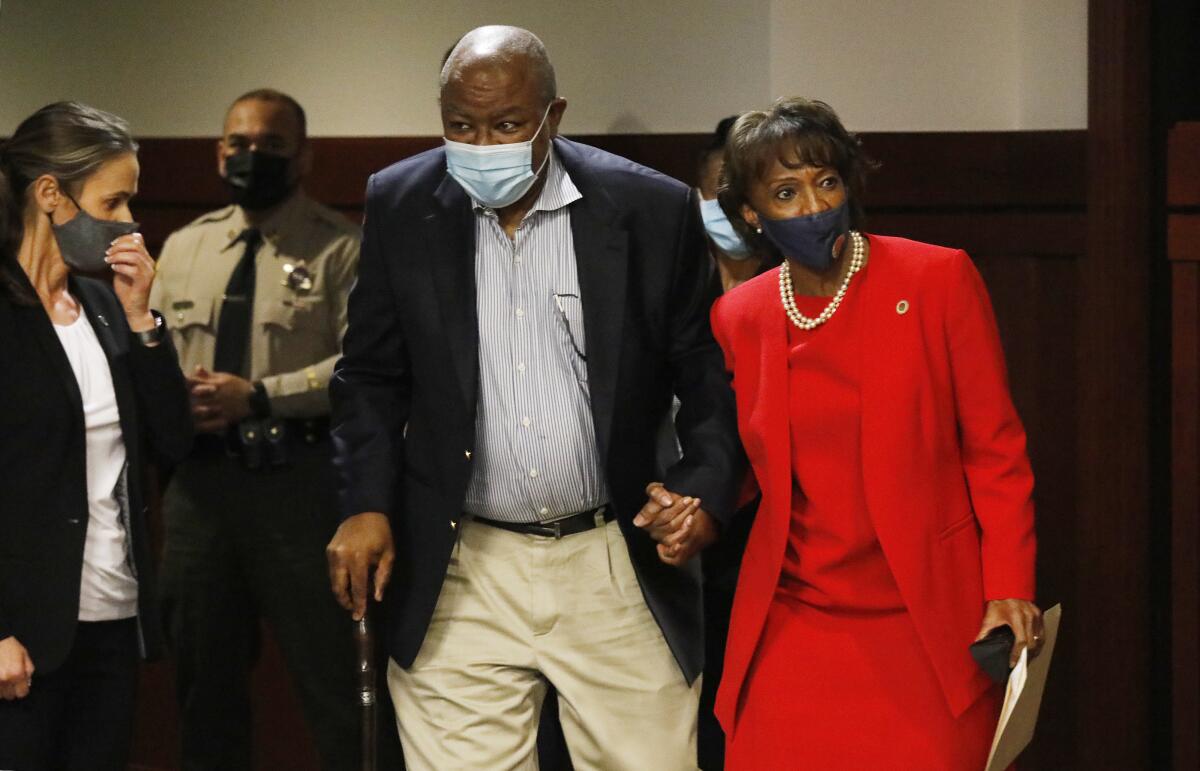Former D.A.’s husband and protesters both crossed the line in 2020 gun incident

- Share via
Let’s first dispose of the easy questions. Should David Lacey, former L.A. County Dist. Atty. Jackie Lacey’s husband, be held accountable for threatening to shoot Black Lives Matter protesters when they appeared at the Laceys’ front door in the predawn gloom of March 2, 2020?
Well of course he should. He had a gun in his hand and he wasn’t just “showing” it, despite Jackie Lacey’s later description of the events. Video evidence suggests that he was pointing it directly at one and perhaps all three of the protesters on his porch when he said, “I will shoot you.” His finger may have been on the trigger. It was the kind of tense and inherently dangerous situation that could cause even the best trained and most experienced of gun-handlers to inadvertently fire in response to a sudden move or unexpected noise. Things could have turned out much worse than they did. He was appropriately charged with assault.
Should he go to jail? Although there has been no trial and no verdict, that question will be before a Los Angeles County Superior Court judge on Tuesday, and it’s also an easy one.
Of course he shouldn’t go to jail. No one should go to jail for an alleged offense that occurred in the heat of the moment, under great stress, in which no one was injured and that is unlikely to be repeated.
The question comes up because his attorney has requested “diversion,” a term that generally means moving the defendant out of the criminal justice system altogether, but that in this case sounds a lot like probation.
That takes us to some questions that are marginally harder — yet on reflection may not be quite so tough after all, especially when the average person imagines standing in David Lacey’s shoes.
What business, for example, do people have coming to your house, raising a ruckus and ringing your doorbell before the sun rises?
That’s what happened in this case. It was around 5:40 a.m., according to a statement made at the time by Cal State Los Angeles professor and Black Lives Matter Los Angeles co-founder Melina Abdullah, when she and perhaps 30 other protesters assembled on the street in front of the Laceys’ Granada Hills home, chanting and banging makeshift drums. Abdullah, Dahlia Ferlito and Justin Marks then walked onto the Laceys’ porch and rang the bell. Remember, it was early March, so at that hour it was still dark. Most people would have been in bed.
If it were your home, you might have called the police, as the Laceys did. Maybe you would not have also grabbed a gun. Maybe you wouldn’t have opened the door.
Or maybe you would have. Especially if your spouse had recently received death threats and had been repeatedly harangued in public. Maybe you would have if your spouse had recently participated in a candidates’ debate, as Jackie Lacey had, repeatedly interrupted by protesters, one of whom rushed the stage. Maybe you would have if at that same debate, after your spouse recounted (as Jackie Lacey did) that her father had once been shot while on his front lawn, some protester in the audience shouted “Good!” while others cheered. And then, when your spouse added that her father fortunately didn’t die, if the same protester shouted, “Too bad!”
And maybe you would have if you were Black, as David and Jackie Lacey are, and recalled the long history of Black people being harassed in their homes during the night by threatening mobs, and that one of the few defenses was to appear in the window with a shotgun to demonstrate that you would protect your home and your family.
No, of course the BLM protesters weren’t burning crosses on the Laceys’ lawn, and they are not racists angry with the D.A. simply for being Black. They’re anti-racist activists, demonstrating against the disproportionate killing of Black people at the hands of police. They demonstrated against Jackie Lacey because, her own race notwithstanding, she did not prosecute officers in hundreds of killings and, importantly, they argue, because she would not agree to a meeting with demonstrators under BLM’s terms. And, Abdullah said at the time, Jackie Lacey often went to 7 a.m. fundraisers, so the protesters felt they had to be there early.
But their purpose was never to force a dialogue. It was to force a crisis. They succeeded, in that the crisis may have helped send Lacey to defeat in November, and it may stand as a warning to any other official, including current D.A. George Gascón, to toe their line.
David Lacey crossed the line, but in this instance, so did the protesters. That context is something for the court to keep in mind when considering how to deal with David Lacey. And indeed context — our individual stresses and our common humanity — must be kept in mind as we all consider how to deal with one another. Our justice system requires more equity, but to truly work, it also needs a little more compassion.
More to Read
A cure for the common opinion
Get thought-provoking perspectives with our weekly newsletter.
You may occasionally receive promotional content from the Los Angeles Times.









